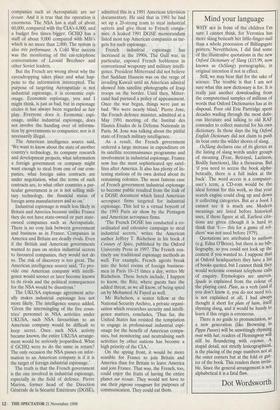Mind your language
WHY not in front of the children I'm sure I cannot think, for Veronica has more slang beneath her little-finger-nail than a whole procession of Billingsgate porters. Nevertheless, I did find some of the illustrative quotations in the new Oxford Dictionary of Slang (£15.99, now known as OxSlang) pornographic, in original intention if not in effect.
Still, we may bear that for the sake of science. The trouble is that I am not sure what this new dictionary is for. It is really just another downloading from the computerised samples of millions of words that Oxford Dictionaries has at its disposal. Poor old Eric Partridge spent decades wading through the most dubi- ous literature and talking to old RAF comrades to collect material for his own dictionary. In those days the big Oxford English Dictionary did not claim to push its boat onto the wilder shores of slang.
OxSlang declares one of its glories as the listing of slang words under groups of meaning (Fear, Betrayal, Laziness, Bodily functions), like a thesaurus. But `if you need to access the book alpha- betically, there is a full index at the back'. The word access is a computer- user's term; a CD-rom would be the ideal format for this work, so that your search engine could chug up and down it collecting categories. But as a book I cannot see it is much use. Modern meanings are listed before historical uses, if these figure at all. Earliest cita- tions are given (though it is hard to think that 1— this for a game of sol- diers' was not used before 1979).
Quotations are attributed to authors (e.g. Edna O'Brien), but there is no bib- liography, so you could not look up the context if you wanted to. I suppose that at Oxford headquarters they have a list of books quoted, but I cannot think they would welcome constant telephone calls of enquiry. Etymologies are uneven. Spade is explained from the colour of the playing card. Plate, as a verb (and if you don't know it, you do not need to), is not explained at all; I had always thought it short for plate of ham, itself rhyming slang, and it would be handy to learn if this origin is erroneous.
There is no guide to pronunciation, so a new generation (like Browning in Pippa Passes) will be unwittingly rhyming twat with hat; readers of Hemingway will still be floundering with cojones. A stupid detail, not strictly lexicographical, is the placing of the page numbers not at the outer corners but at the fold or gut- ter of the book. This renders them invisi- ble. Since the general arrangement is not alphabetical it is a fatal flaw.
Dot Wordsworth


















































































 Previous page
Previous page